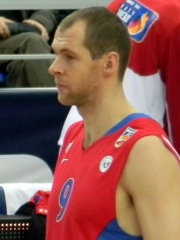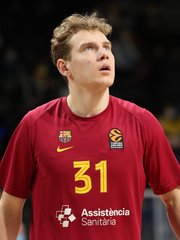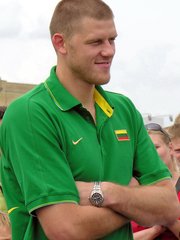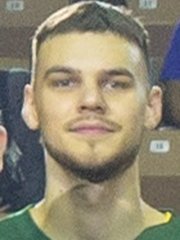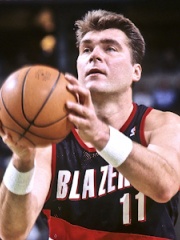
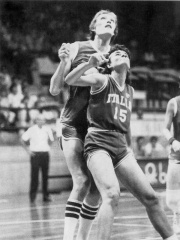
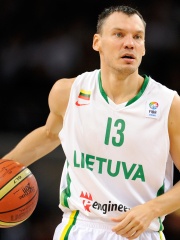
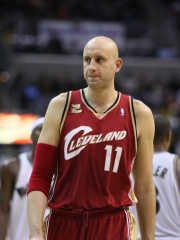
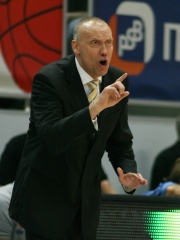
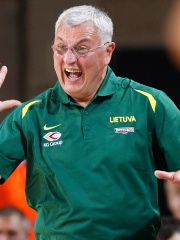
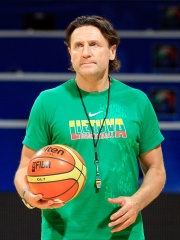
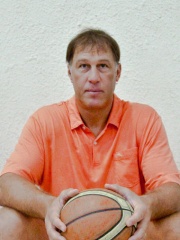
The Most Famous
BASKETBALL PLAYERS from Lithuania
This page contains a list of the greatest Lithuanian Basketball Players. The pantheon dataset contains 1,757 Basketball Players, 52 of which were born in Lithuania. This makes Lithuania the birth place of the 6th most number of Basketball Players behind France, and Croatia.
Top 10
The following people are considered by Pantheon to be the top 10 most legendary Lithuanian Basketball Players of all time. This list of famous Lithuanian Basketball Players is sorted by HPI (Historical Popularity Index), a metric that aggregates information on a biography's online popularity. Visit the rankings page to view the entire list of Lithuanian Basketball Players.

1. Arvydas Sabonis (b. 1964)
With an HPI of 64.09, Arvydas Sabonis is the most famous Lithuanian Basketball Player. His biography has been translated into 51 different languages on wikipedia.
Arvydas Romas Sabonis (Lithuanian pronunciation: [ˈaːrviːdaːs ˈsaːboːnʲɪs]; born 19 December 1964) is a Lithuanian former professional basketball player and businessman. Sabonis won the Euroscar six times and the Mr. Europa Award twice. He played in a variety of leagues, including the Spanish ACB League, and spent seven seasons in the National Basketball Association (NBA). Playing the center position, Sabonis won a gold medal at the 1988 Summer Olympics, in South Korea, for the Soviet Union, and later earned bronze medals at the 1992 Olympic Games and 1996 Olympic Games representing Lithuania. He retired from professional basketball in 2005. Sabonis was selected by the Portland Trail Blazers in the first round of the 1986 NBA draft, but he did not play his first NBA game until 1995, at the age of 30. On 20 August 2010, Sabonis was inducted into the FIBA Hall of Fame in recognition of his great play in international competition. On 4 April 2011, Sabonis was named to the Naismith Memorial Basketball Hall of Fame, and he was inducted on 12 August 2011. On 24 October 2011, Sabonis was voted as the next President of the Lithuanian Basketball Federation, replacing Vladas Garastas, who had led the LBF since 1991. He resigned from the position on 2 October 2013, but he came back to it on 10 October 2013. His son, Domantas Sabonis, plays for the NBA's Sacramento Kings as of 2025.

2. Uljana Semjonova (b. 1952)
With an HPI of 63.04, Uljana Semjonova is the 2nd most famous Lithuanian Basketball Player. Her biography has been translated into 32 different languages.
Iulijana Larionovna Semjonova (Russian: Юлияна Ларионовна Семёнова, romanized: Iuliana Larionovna Semyonova; born 9 March 1952) is a retired Latvian basketball player of Russian descent who competed for the Soviet Union. Semjonova was the leading women's basketball player in the world in the 1970s and 1980s. Wearing a men's size 21 (US) / 58 (EU) shoe, she was known for having the largest feet ever in women's basketball. For almost all of her playing career, she played for TTT Riga, which was part of Daugava Voluntary Sports Society. With TTT, she won 15 championships in the Soviet Union and the European Champion's Cup 15 times. Semjonova was also very dominant in international play, winning two Olympic Gold medals while playing for the USSR in 1976 and 1980 and never lost a game in official international competition. Between 1968 and 1985 she played 100 games for the Soviet Union, scoring 1614 points, committing 174 personal fouls and making 162 of 249 free throws. She was awarded the Order of the Red Banner of Labour in 1976, and in 1993 became the first non-US woman enshrined into the Basketball Hall of Fame. She was an inaugural member of the Women's Basketball Hall of Fame in the class of 1999. In 2007, she was enshrined in the FIBA Hall of Fame. During the 2007 Latvian sports personality of the year award ceremony, Semjonova received the Lifetime Contribution to Sport award.

3. Šarūnas Jasikevičius (b. 1976)
With an HPI of 59.80, Šarūnas Jasikevičius is the 3rd most famous Lithuanian Basketball Player. His biography has been translated into 34 different languages.
Šarūnas "Šaras" Jasikevičius ([ʃɐˈrûːnɐs jɛsʲɪˈkʲæːvʲɪtɕʊs] ; born 5 March 1976) is a Lithuanian professional basketball coach and former player who is the head coach for Fenerbahçe Beko of the Turkish Basketbol Süper Ligi and the EuroLeague. During his playing career, standing at a height of 6 ft 4 in (1.93 m) tall, he played at the point guard position. Often considered one of the best Lithuanian and European point guards ever, Jasikevičius was a two-time All-EuroLeague First Team selection, the EuroLeague Final Four MVP in 2005 and a four-time triple crown winner. He was named the 2005 Israeli Basketball Premier League MVP. Moreover, he was the first player in EuroLeague history to win the competition with three clubs. A former representative of the senior Lithuanian men's national team, he won the gold medal at 2003 EuroBasket, earning an All-EuroBasket Team selection and MVP honors in the process. He also won the bronze medal at the 2000 Summer Olympic Games, and the bronze medal at 2007 EuroBasket. In 2015, Jasikevičius was named a EuroLeague Basketball Legend as a reward for his playing career and was honored with a ceremony. He has won both Liga ACB and Spanish Cup with Barcelona as both a coach and player, as well as both Turkish Basketball League and Turkish Cup with Fenerbahçe in same capacities. He also won the Euroleague title as Fenerbahçe coach in 2025. Additionally, he achieved victory in the Lithuanian League with Zalgiris, also as both coach and player.

4. Zydrunas Ilgauskas (b. 1975)
With an HPI of 59.40, Zydrunas Ilgauskas is the 4th most famous Lithuanian Basketball Player. His biography has been translated into 35 different languages.
Zydrunas Ilgauskas (Lithuanian: Žydrūnas Ilgauskas; Lithuanian pronunciation: [ʑiːˈdrûːnɐs ɪɫˈɡɐ̂ˑʊ̯skɐs] ; born June 5, 1975) is a Lithuanian-born American former professional basketball player who played the center position. The 7 ft 3 in (2.21 m) Ilgauskas played for the Cleveland Cavaliers of the National Basketball Association from 1997 to 2010 and played for the Miami Heat during the 2010–11 season. He was named to the 1997–98 All-Rookie First Team and is a two-time NBA All-Star. Ilgauskas played in the 2007 NBA Finals as a member of the Cavaliers. He is known for his accurate jump shot, for his rebounding, and for overcoming difficult injury challenges during his career. Nicknamed Big Z, Ilgauskas is the Cavaliers' career leader in blocked shots; his jersey no. 11 has been retired by the team. In 2012, Ilgauskas joined the Cavaliers' front office, becoming a special advisor to the organization.
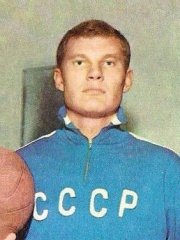
5. Modestas Paulauskas (b. 1945)
With an HPI of 59.00, Modestas Paulauskas is the 5th most famous Lithuanian Basketball Player. His biography has been translated into 20 different languages.
Modestas "Iron Modė" Paulauskas (19 March 1945) is a Lithuanian former professional basketball player and coach. As a player, he was the youngest EuroBasket MVP in history, being only 20 years old at the time he won the award. He is known for having been one of the best Lithuanian basketball players of all time, and for having excellent dribbling ability. He was selected as the Lithuanian Sportsman of the Year, a record seven times, in 1965–1967, and 1969–1972. He was a member of the Soviet Union team that won gold medal at the 1972 Summer Olympics. In 1991, he was named one of FIBA's 50 Greatest Players. In 2021, he was included into the FIBA Hall of Fame.

6. Rimas Kurtinaitis (b. 1960)
With an HPI of 58.73, Rimas Kurtinaitis is the 6th most famous Lithuanian Basketball Player. His biography has been translated into 29 different languages.
Rimas Kurtinaitis (born 15 May 1960) is a Lithuanian professional basketball coach and former player who is the head coach for Lithuania men's national team and Sabah of the Azerbaijan Basketball League (ABL). As a player, he was a member of the senior Soviet Union and Lithuania national teams, and won a gold medal at the 1988 Summer Olympics. During his playing career, at a height of 1.96 m (6 ft 5 in) tall, he played at the shooting guard position. He is the only non-NBA player to ever participate at the NBA All-Star Weekend's Three-Point Contest, doing so in 1989, where he scored 9 points.

7. Jonas Kazlauskas (b. 1954)
With an HPI of 56.61, Jonas Kazlauskas is the 7th most famous Lithuanian Basketball Player. His biography has been translated into 20 different languages.
Jonas Kazlauskas (born 21 November 1954) is a Lithuanian professional basketball coach and former player. He was most recently the head coach of the Guangdong Southern Tigers in the Chinese Basketball Association (CBA).

8. Valdemaras Chomičius (b. 1959)
With an HPI of 55.46, Valdemaras Chomičius is the 8th most famous Lithuanian Basketball Player. His biography has been translated into 22 different languages.
Valdemaras Chomičius (also known as Valdemaras Homicius; born 4 May 1959) is a Lithuanian former professional basketball player. He represented the Soviet Union and Lithuania national teams, and was an assistant coach for Lithuania.

9. Šarūnas Marčiulionis (b. 1964)
With an HPI of 53.97, Šarūnas Marčiulionis is the 9th most famous Lithuanian Basketball Player. His biography has been translated into 35 different languages.
Raimondas Šarūnas Marčiulionis (Lithuanian: [ˈrɐ̂ˑɪ̯mɔndɐs ʃɐˈrûːnɐs mɐrʲtɕʊˈlʲôːnʲɪs] ; born June 13, 1964) is a Lithuanian former professional basketball player. Widely considered one of the greatest international players, he was one of the first Europeans to become a regular in the National Basketball Association (NBA). Marčiulionis was inducted into the Naismith Memorial Basketball Hall of Fame in 2014 and became a member of the FIBA Hall of Fame in 2015. In the 1988 Summer Olympics, together with teammate Arvydas Sabonis, Marčiulionis led the senior USSR national team to the gold medal. With the senior Lithuanian national team, he won two Summer Olympics bronze medals, in 1992 and 1996. He was an All-Tournament Team member, the top scorer, and the MVP of the EuroBasket 1995, and he was also elected to the All-EuroBasket Team in 1987. Marčiulionis is also often remembered for and associated with the Euro step move during his seven seasons playing in the NBA, which was popularized by Manu Ginóbili in the mid-2000s.
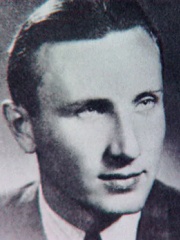
10. Stepas Butautas (1925 - 2001)
With an HPI of 53.82, Stepas Butautas is the 10th most famous Lithuanian Basketball Player. His biography has been translated into 17 different languages.
Stepas Butautas (alternate spellings: Stiepas, Butaustas) (25 August 1925 – 22 March 2001 in Kaunas) was a Soviet and Lithuanian professional basketball player and coach. He trained at the VSS Žalgiris, in Kaunas. He played with the Soviet Union men's national basketball team at the 1952 Summer Olympic Games, where he won a silver medal. During the tournament, he played in all eight games. He was named one of FIBA's 50 Greatest Players in 1991.
People
Pantheon has 52 people classified as Lithuanian basketball players born between 1925 and 2000. Of these 52, 51 (98.08%) of them are still alive today. The most famous living Lithuanian basketball players include Arvydas Sabonis, Uljana Semjonova, and Šarūnas Jasikevičius. The most famous deceased Lithuanian basketball players include Stepas Butautas. As of April 2024, 5 new Lithuanian basketball players have been added to Pantheon including Natalya Zasulskaya, Kęstutis Marčiulionis, and Rokas Jokubaitis.
Living Lithuanian Basketball Players
Go to all RankingsArvydas Sabonis
1964 - Present
HPI: 64.09
Uljana Semjonova
1952 - Present
HPI: 63.04
Šarūnas Jasikevičius
1976 - Present
HPI: 59.80
Zydrunas Ilgauskas
1975 - Present
HPI: 59.40
Modestas Paulauskas
1945 - Present
HPI: 59.00
Rimas Kurtinaitis
1960 - Present
HPI: 58.73
Jonas Kazlauskas
1954 - Present
HPI: 56.61
Valdemaras Chomičius
1959 - Present
HPI: 55.46
Šarūnas Marčiulionis
1964 - Present
HPI: 53.97
Sergejus Jovaiša
1954 - Present
HPI: 51.14
Ramūnas Šiškauskas
1978 - Present
HPI: 51.12
Angelė Rupšienė
1952 - Present
HPI: 50.82
Deceased Lithuanian Basketball Players
Go to all RankingsNewly Added Lithuanian Basketball Players (2025)
Go to all RankingsNatalya Zasulskaya
1969 - Present
HPI: 42.42
Kęstutis Marčiulionis
1977 - Present
HPI: 39.64
Rokas Jokubaitis
2000 - Present
HPI: 38.35
Marijonas Petravičius
1979 - Present
HPI: 37.46
Deividas Sirvydis
2000 - Present
HPI: 33.50


